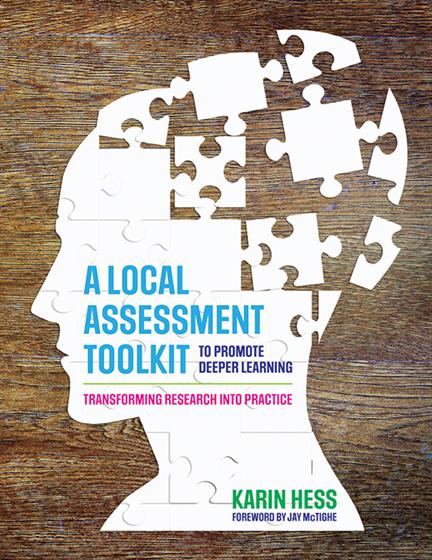Foreword
Acknowledgments
About the Author
Introduction
Module 1: Are My Students Thinking Deeply or Just Working Harder? Infusing Rigor Into Instruction and Assessment: Laying the Groundwork for Deeper Learning for All Students
1.1 What Is Cognitive Rigor?
1.2 Developing a Common Understanding of What Cognitive Rigor Is and What It Is Not
1.3 Seven Common Misconceptions About Rigor
1.4 Bloom Meets Webb: Origins of the Hess Cognitive Rigor Matrix
Reflections
1.5 Getting Started Applying Your Understanding of Rigor and Deeper Learning
Part 2: Support Materials for Module 1
I. A Workshop Plan for Module 1
II. The Hess Cognitive Rigor Tools: About the Tools in This Module
III. Strategies and Tools for Professional Developers and Teacher Planning
IV. Kid Tools: Resources for Use With Students to Support Deeper Thinking
Module 2: Is the Task Appropriate to the Text? Examining and Using Increasingly Complex Texts
2.1 What Makes Texts Complex, and Why Should Every Teacher Care?
2.2 The Thinking Behind the Tools in Module 2
2.3 Five Key Learnings From a Text Complexity Analysis Process
2.4 Understanding Quantitative and Qualitative Complexity Measures
2.5 Unpacking Overall Text Complexity Using a Qualitative Analysis Approach
2.6 A Detailed Discussion of What to Look for—Eight Qualitative Complexity Factors
Reflections
Part 2: Support Materials for Module 2
I. A Workshop Plan for Module 2
II. The Hess Text Complexity Tools: About the Tools in This Module
III. The Importance of Teaching About Text Structures
IV. Sample Instructional Strategies for Teaching About Text Structures
V. Sample Text-Based Assessment Strategies
Module 3: What Does This Test Really Measure? Designing and Refining High-Quality Assessments for Deeper Learning
3.1 What Is a High-Quality Assessment?
3.2 Assessment Purposes and Use: Formative, Interim, and Summative
3.3 Developing and Refining Rubrics and Scoring Guides
3.4 What Can You Learn From Analyzing Student Work Products?
3.5 Developing Anchor Papers for Performance Tasks and Anchor Sets for Calibration
3.6 Cognitive Labs: An Effective and Efficient Alternative to Piloting New Assessments
Cognitive Lab Part 1: Observe and Document—Done While Students Are Working
Cognitive Lab Part 2: Small Group Interview
Cognitive Lab Part 3A: Interpret Student Work Samples and Make Decisions
Cognitive Lab Part 3B: Collaboratively Interpreting Evidence in Student Work
3.7 Guidelines for Creating Task Validation Teams: Analyzing Technical Quality of Assessments
Local Assessment Cover Page for Task Validation
Analyzing Assessments for Technical Quality: Conducting a Task Validation
Reflections
Part 2: Support Materials for Module 3
I. A Workshop Plan for Module 3
II. The Hess PLC Tools: About the Tools in This Module
III. Strategies and Tools for Professional Developers and Teacher Planning
IV. Sample Formative Assessment Strategies
V. Sample Performance Assessment Design Strategies
Module 4: Where Do I Start, What Do I Teach Next, Which Supports Work Best? Using Learning Progressions as a Schema for Planning Instruction and Measuring Progress
4.1 What Are Learning Progressions (or Learning Trajectories), and How Can They Be Used to Scaffold Instruction and Guide the Design and Use of Assessments of Deeper Learning?
4.2 Four Interrelated Guiding Principles of Learning Progressions
4.3 Standards, Learning Progressions, and Curriculum: How Are They Related?
4.4 Zooming “In” and Zooming “Out” of Learning Progressions: Two Sides to the Same Coin
4.5 Applying the Four Interrelated Guiding Principles to Better Understand a Learning Progression
4.6 Providing System Coherence: Using Learning Progressions for Instructional and Assessment Planning
4.7 Lessons Learned—Using Learning Progressions to Guide Instruction and Change Assessment Practices
4.8 Looking for Increasing Rigor—by Observing Shifts in Teacher and Student Roles
4.9 Suggested Ways to Get Started Using the “Looking for Rigor” Walk-Through Tool #26
Reflections
Part 2: Support Materials for Module 4
I. A Workshop Plan for Module 4
II. The Hess LP Tools: About the Tools in This Module
III. Strategies and Tools for Professional Developers and Teacher Planning
IV. Strategies and Resources for Use With Students
Module 5: Is This a Collection of Tests or an Assessment System? Building and Sustaining a Local Comprehensive Assessment System for Deeper Learning
5.1 Rethinking What It Means to Have a Comprehensive Local Assessment System
5.2 Five Indicators of a Comprehensive Local Assessment System
5.3 Multiple Measures and Common Assessments
5.4 What Exactly Are “Common” Assessments and Where Do They Fit in the Local Assessment System?
5.5 Revisiting Alignment From a Systems Perspective
5.6 Interpreting Results From Local Assessment Analyses
Reflections
Part 2: Support Materials for Module 5
I. A Workshop Plan for Module 5
II. The Hess Alignment Tools: About the Tools in This Module
Appendices
Appendix A: Summary of Hess Tools to Guide Local Assessment Development, Instructional Planning, and PLC Activities
Appendix B: Instructional and Formative Assessment Strategies to Uncover Thinking
Appendix C: Troubleshooting Tips When Designing Assessment Items and Tasks
Appendix D: Sample “What I Need to Do” Rubrics—Science, ELA, Mathematics, Blank Template
Appendix E: Student Profile: Science Inquiry Learning Progression
Appendix F: Student Learning Progression Literacy Profile—Grades 7–8
Appendix G: Writing Persuasively Learning Progression (Strand 7, LPF)
Appendix H: LPF STRAND 7 (Grades K–2) Sample Lesson Planning Steps Using Learning Progressions
Appendix I: An Expanded Glossary for Understanding and Designing Comprehensive Local Assessment Systems
References
Index




